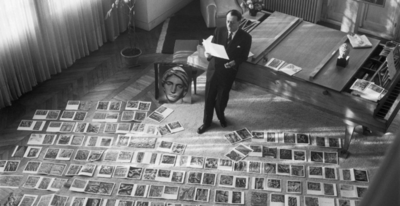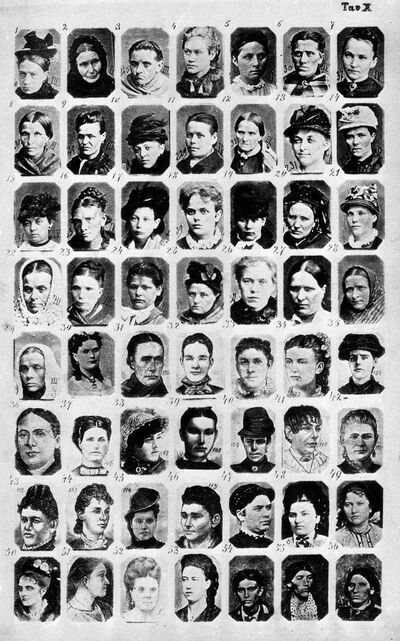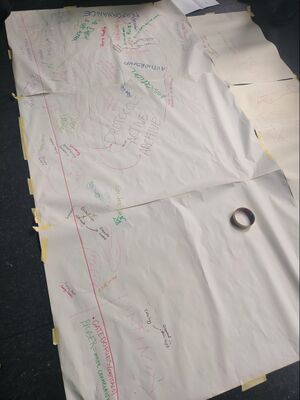Methods xpub: Difference between revisions
| (165 intermediate revisions by 12 users not shown) | |||
| Line 1: | Line 1: | ||
In this series of workshops we concentrate on methods of annotation and text analysis which help us research this trimester's Special Issue. Each session has a specific outcome. | |||
==XPUB1: 20 Sept 2023- 11:00 - 17:00 Methods for PROTOCOLS FOR AN ACTIVE ARCHIVE with Steve + Lidia, in the aquarium== | |||
XPUB1: 11:00 - 17:00 Methods with Steve + Lidia, in the aquarium | |||
'''Methods sesh #1 PROTOCOLS FOR AN ACTIVE ARCHIVE with Lidia and Steve''' | |||
The | [[File:AndreMalrauxs1950.png|400px|thumb|left|André Malraux's "The imaginary museum" from 1950. Image: Krauss, Rosalind: Das Schicksalsministerium, In: Wolf, Herta (Ed.): Paradigma Fotografie-Fotokritik am Ende des fotografischen Zeitalters. Bd. 1. Frankfurt/Main: Suhrkamp Verlag. 2002, p. 395.]] | ||
'''Outcome for the day:''' 4 annotations and discussion in which reading experiences are compared. | |||
'''Outcome for the PROTOCOLS FOR AN ACTIVE ARCHIVE methods seminars (December):''' an annotated reader. | |||
Intro: | |||
Whilst working on PROTOCOLS FOR AN ACTIVE ARCHIVE, the methods sessions provide a moment to step back and consider the special issue we are working on. We take time to reflect. In the first session we will experiment with methods of collective annotation. This is an informal, group activity that helps collective reading and thinking. We read and take notes, share knowledge and raise questions. | |||
1) Brief intros: how, what and why we annotate? | |||
Protocol: For this session Steve and Lidia have chosen 4 texts which relate to PROTOCOLS FOR AN ACTIVE ARCHIVE. We will try out a collective annotation in a big group to establish the principle. As we progress, we can use these reading and annotation sessions to add texts (in which case "text" can be widely defined) and establish new protocols through which to collectively annotate. After several sessions a "reader" will be generated. | |||
2) The group split into 4 sub-groups and annotate one of the texts below. | |||
3) The groups will gather into one group and reflect on their reading of the texts (the "thesis", the similarities and differences between texts). | |||
4) Building a PROTOCOLS FOR AN ACTIVE ARCHIVE bibliography together (in which case "bibliography" can be widely defined). | |||
Group 1 | |||
'''On the data set’s ruins''' | |||
Nicolas Malevé (2020) | |||
https://sci-hub.se/10.1007/s00146-020-01093-w | |||
'''ANNOTATE HERE:''' https://pad.xpub.nl/p/AnnotateDataset'sRuins | |||
Group 2 | |||
'''Postscript on the Societies of Control''' | |||
Gilles Deleuze (1992) | |||
https://cidadeinseguranca.files.wordpress.com/2012/02/deleuze_control.pdf | |||
'''Collective Annotation:''' https://pad.xpub.nl/p/PostscriptControlSocieties | |||
'''Subgroup Annotation:''' https://pad.xpub.nl/p/Deleuze_Control_Group | |||
Group 3 | |||
'''The Tyranny of Structurelessness''' | |||
Jo Freeman (1970-73) | |||
https://www.jofreeman.com/joreen/tyranny.htm | |||
'''ANNOTATE HERE:''' https://pad.xpub.nl/p/TyrannyAnnotation | |||
Group 4 | |||
'''Queering Homophily''' | |||
Wendy Chun (2018) | |||
https://meson.press/wp-content/uploads/2018/11/9783957961457-Pattern-Discrimination.pdf | |||
(PAGE 59) | |||
'''ANNOTATE HERE:''' https://pad.xpub.nl/p/QueeringHomophily | |||
https://pad.xpub.nl/p/MethodsSesh123 | |||
==Barthes Radio== | |||
[[BarthesRadio]] | |||
Text for next week: https://pad.xpub.nl/p/BarthesWormRadio | |||
Upload Barthes sound files here: https://pzwiki.wdka.nl/mediadesign/BarthesRadio | |||
[[File:CesareLombroso.jpg|400px|thumb|left|Album of photographs gathered by Cesare Lombroso (1835-1909), Italian criminologist: the photographs correspond to different types of criminals (at least according to the system Lombroso used). “The criminal man”]] | |||
2 | ==Methods Session #2== | ||
11:00 - 17:00 Xpub1 Methods with Lídia | |||
'''Methods sesh #2 PROTOCOLS FOR AN ACTIVE ARCHIVE with Lídia''' | |||
'''Outcome for the day:''' Collective visual mapping exercise, introduction to PROTOCOLS FOR AN ACTIVE ARCHIVE glossary | |||
'''Outcome for the PROTOCOLS FOR AN ACTIVE ARCHIVE methods seminars (December):''' an annotated reader. | |||
'''Intro:''' | |||
In the second session, we will finish the collective annotation experiment of our previous session. In order to start processing the materials and connecting these texts to what you have been doing and reading with Michael, Manetta & Joseph, we will then get started on a visual mapping exercise in order to link concepts, practices and ideas. This map will be an ongoing process. Finally, we will introduce the PROTOCOLS FOR AN ACTIVE ARCHIVE glossary. | |||
1) Finish collective annotation exercise in 4 groups. | |||
2) The groups will gather into one group and reflect on their reading of the texts (the commonalities, the divergences, the updates, agreements and disagreements). | |||
3) Collective visual mapping of concepts, practices and ideas discussed so far. | |||
3) Introduction of PROTOCOLS FOR AN ACTIVE ARCHIVE glossary. | |||
PAD OF THE DAY: https://pad.xpub.nl/p/MethodsSesh410 | |||
( | '''Group 1''' <br> | ||
"On the data set’s ruins", Nicolas Malevé (2020)<br> | |||
https://sci-hub.se/10.1007/s00146-020-01093-w<br> | |||
ANNOTATE HERE: https://pad.xpub.nl/p/AnnotateDataset'sRuins | |||
''Who:''<br> | |||
Thijs<br> | |||
Bernadette<br> | |||
Victor<br> | |||
Rosa | |||
https:// | '''Group 2'''<br> | ||
"Postscript on the Societies of Control", Gilles Deleuze (1992)<br> | |||
https://cidadeinseguranca.files.wordpress.com/2012/02/deleuze_control.pdf<br> | |||
ANNOTATE HERE: https://pad.xpub.nl/p/Deleuze_Control_Group | |||
''Who:''<br> | |||
Riviera<br> | |||
Alessia<br> | |||
Maria | |||
https:// | '''Group 3'''<br> | ||
"The Tyranny of Structurelessness", Jo Freeman (1970-73)<br> | |||
https://www.jofreeman.com/joreen/tyranny.htm<br> | |||
ANNOTATE HERE: https://pad.xpub.nl/p/TyrannyAnnotation | |||
''Who:''<br> | |||
Zuzu<br> | |||
Lorenzo<br> | |||
Michel<br> | |||
Mania | |||
'''Group 4'''<br> | |||
"Queering Homophily", Wendy Chun (2018)<br> | |||
https://meson.press/wp-content/uploads/2018/11/9783957961457-Pattern-Discrimination.pdf (PAGE 59)<br> | |||
ANNOTATE HERE: https://pad.xpub.nl/p/QueeringHomophily | |||
''Who:''<br> | |||
Senka<br> | |||
Anita<br> | |||
Wang | |||
=== Methods Session #3=== | |||
* | * with Steve | ||
Outcomes: A GLOSSARY for a PROTOCOLS FOR AN ACTIVE ARCHIVE + Visual map of PROTOCOLS FOR AN ACTIVE ARCHIVE. | |||
Pad of the day: https://pad.xpub.nl/p/Wed-11-Oct23 | |||
[[File:Visual map.jpg|thumb|Visual map]] | |||
https://pad.xpub.nl/p/Problemsofnotation-for_annotation | |||
References: | |||
Scratch Orchestra's Nature Study Notes (1969) http://intuitivemusic.dk/iima/sonsn.pdf | |||
John Cage's Song Books Vol 1 (1970) https://monoskop.org/images/0/03/Cage_John_Song_Books_Volume_1.pdf | |||
Pad: https://pad.xpub.nl/p/LensBasedScratchNov2 | |||
Addition to small library: Eno: Oblique Strategies (card game) | |||
https://monoskop.org/images/8/8c/Eno_Brian_Schmidt_Peter_Oblique_Strategies.pdf | |||
11:00 Review progress; | |||
Intro: The Annotated Problems of Annotation are Problems of the Masses (some links and rabbit holes). | |||
From 11:30 work on | |||
AM: Visual Map (use to gather words for glossary) | |||
PM: Glossary for an Active Archive | |||
"'When I use a word,' Humpty Dumpty said in rather a scornful tone, 'it means just what I choose it to mean — neither more nor less." | |||
[[GLOSSARY of PROTOCOLS FOR AN ACTIVE ARCHIVE]] | |||
Definition (general) | |||
Definition (as used by us) | |||
Mentioned in: | |||
In use (in context; example) | |||
[[Glossary of productive play]] | |||
This is a TEST PAGE | |||
[[Prototype for a Glossary]] | |||
This is the glossary: | |||
=='''[[Wordhole]]'''== | |||
Wordhole as category list | |||
https://pzwiki.wdka.nl/mediadesign/Category:Wordhole | |||
==Post-Apocalypse== | |||
11:00 - 17:00: The first Post-Apocalypse (ongoing apocalypse) Methods class with Steve | |||
Pad of the day: https://pad.xpub.nl/p/2023-11-29 | |||
==Project That May...== | |||
Pad That May or May not be...: https://pad.xpub.nl/p/17-4-24MethodsProjectsThat | |||
{{:RapidPrototypeandProject that May}} | |||
==Previously...== | |||
Archive of the 2023 methods sessions: [[Methods2023Archive]] | |||
Here is a link to Xpub Rapid Prototypes and Projects That May or May Not: | |||
[[Rapid Prototype Session 2]] | |||
Here is a page with all the methods sessions in SI18, SI19, SI20 (made for the audit by Leslie and Manetta): [[Methods SI18 SI19 SI20]]. | |||
[[ | Here is the archive of methods sessions from previous years [[Pre2020Methods]] | ||
Latest revision as of 10:37, 15 May 2024
In this series of workshops we concentrate on methods of annotation and text analysis which help us research this trimester's Special Issue. Each session has a specific outcome.
XPUB1: 20 Sept 2023- 11:00 - 17:00 Methods for PROTOCOLS FOR AN ACTIVE ARCHIVE with Steve + Lidia, in the aquarium
XPUB1: 11:00 - 17:00 Methods with Steve + Lidia, in the aquarium
Methods sesh #1 PROTOCOLS FOR AN ACTIVE ARCHIVE with Lidia and Steve
Outcome for the day: 4 annotations and discussion in which reading experiences are compared.
Outcome for the PROTOCOLS FOR AN ACTIVE ARCHIVE methods seminars (December): an annotated reader.
Intro:
Whilst working on PROTOCOLS FOR AN ACTIVE ARCHIVE, the methods sessions provide a moment to step back and consider the special issue we are working on. We take time to reflect. In the first session we will experiment with methods of collective annotation. This is an informal, group activity that helps collective reading and thinking. We read and take notes, share knowledge and raise questions.
1) Brief intros: how, what and why we annotate?
Protocol: For this session Steve and Lidia have chosen 4 texts which relate to PROTOCOLS FOR AN ACTIVE ARCHIVE. We will try out a collective annotation in a big group to establish the principle. As we progress, we can use these reading and annotation sessions to add texts (in which case "text" can be widely defined) and establish new protocols through which to collectively annotate. After several sessions a "reader" will be generated.
2) The group split into 4 sub-groups and annotate one of the texts below.
3) The groups will gather into one group and reflect on their reading of the texts (the "thesis", the similarities and differences between texts).
4) Building a PROTOCOLS FOR AN ACTIVE ARCHIVE bibliography together (in which case "bibliography" can be widely defined).
Group 1
On the data set’s ruins
Nicolas Malevé (2020)
https://sci-hub.se/10.1007/s00146-020-01093-w
ANNOTATE HERE: https://pad.xpub.nl/p/AnnotateDataset'sRuins
Group 2
Postscript on the Societies of Control
Gilles Deleuze (1992)
https://cidadeinseguranca.files.wordpress.com/2012/02/deleuze_control.pdf
Collective Annotation: https://pad.xpub.nl/p/PostscriptControlSocieties
Subgroup Annotation: https://pad.xpub.nl/p/Deleuze_Control_Group
Group 3
The Tyranny of Structurelessness
Jo Freeman (1970-73)
https://www.jofreeman.com/joreen/tyranny.htm
ANNOTATE HERE: https://pad.xpub.nl/p/TyrannyAnnotation
Group 4
Queering Homophily
Wendy Chun (2018)
https://meson.press/wp-content/uploads/2018/11/9783957961457-Pattern-Discrimination.pdf
(PAGE 59)
ANNOTATE HERE: https://pad.xpub.nl/p/QueeringHomophily
https://pad.xpub.nl/p/MethodsSesh123
Barthes Radio
Text for next week: https://pad.xpub.nl/p/BarthesWormRadio
Upload Barthes sound files here: https://pzwiki.wdka.nl/mediadesign/BarthesRadio
Methods Session #2
11:00 - 17:00 Xpub1 Methods with Lídia
Methods sesh #2 PROTOCOLS FOR AN ACTIVE ARCHIVE with Lídia
Outcome for the day: Collective visual mapping exercise, introduction to PROTOCOLS FOR AN ACTIVE ARCHIVE glossary
Outcome for the PROTOCOLS FOR AN ACTIVE ARCHIVE methods seminars (December): an annotated reader.
Intro:
In the second session, we will finish the collective annotation experiment of our previous session. In order to start processing the materials and connecting these texts to what you have been doing and reading with Michael, Manetta & Joseph, we will then get started on a visual mapping exercise in order to link concepts, practices and ideas. This map will be an ongoing process. Finally, we will introduce the PROTOCOLS FOR AN ACTIVE ARCHIVE glossary.
1) Finish collective annotation exercise in 4 groups.
2) The groups will gather into one group and reflect on their reading of the texts (the commonalities, the divergences, the updates, agreements and disagreements).
3) Collective visual mapping of concepts, practices and ideas discussed so far.
3) Introduction of PROTOCOLS FOR AN ACTIVE ARCHIVE glossary.
PAD OF THE DAY: https://pad.xpub.nl/p/MethodsSesh410
Group 1
"On the data set’s ruins", Nicolas Malevé (2020)
https://sci-hub.se/10.1007/s00146-020-01093-w
ANNOTATE HERE: https://pad.xpub.nl/p/AnnotateDataset'sRuins
Who:
Thijs
Bernadette
Victor
Rosa
Group 2
"Postscript on the Societies of Control", Gilles Deleuze (1992)
https://cidadeinseguranca.files.wordpress.com/2012/02/deleuze_control.pdf
ANNOTATE HERE: https://pad.xpub.nl/p/Deleuze_Control_Group
Who:
Riviera
Alessia
Maria
Group 3
"The Tyranny of Structurelessness", Jo Freeman (1970-73)
https://www.jofreeman.com/joreen/tyranny.htm
ANNOTATE HERE: https://pad.xpub.nl/p/TyrannyAnnotation
Who:
Zuzu
Lorenzo
Michel
Mania
Group 4
"Queering Homophily", Wendy Chun (2018)
https://meson.press/wp-content/uploads/2018/11/9783957961457-Pattern-Discrimination.pdf (PAGE 59)
ANNOTATE HERE: https://pad.xpub.nl/p/QueeringHomophily
Who:
Senka
Anita
Wang
Methods Session #3
- with Steve
Outcomes: A GLOSSARY for a PROTOCOLS FOR AN ACTIVE ARCHIVE + Visual map of PROTOCOLS FOR AN ACTIVE ARCHIVE.
Pad of the day: https://pad.xpub.nl/p/Wed-11-Oct23
https://pad.xpub.nl/p/Problemsofnotation-for_annotation
References:
Scratch Orchestra's Nature Study Notes (1969) http://intuitivemusic.dk/iima/sonsn.pdf
John Cage's Song Books Vol 1 (1970) https://monoskop.org/images/0/03/Cage_John_Song_Books_Volume_1.pdf
Pad: https://pad.xpub.nl/p/LensBasedScratchNov2
Addition to small library: Eno: Oblique Strategies (card game)
https://monoskop.org/images/8/8c/Eno_Brian_Schmidt_Peter_Oblique_Strategies.pdf
11:00 Review progress;
Intro: The Annotated Problems of Annotation are Problems of the Masses (some links and rabbit holes).
From 11:30 work on
AM: Visual Map (use to gather words for glossary)
PM: Glossary for an Active Archive
"'When I use a word,' Humpty Dumpty said in rather a scornful tone, 'it means just what I choose it to mean — neither more nor less."
GLOSSARY of PROTOCOLS FOR AN ACTIVE ARCHIVE
Definition (general)
Definition (as used by us)
Mentioned in:
In use (in context; example)
This is a TEST PAGE
This is the glossary:
Wordhole
Wordhole as category list
https://pzwiki.wdka.nl/mediadesign/Category:Wordhole
Post-Apocalypse
11:00 - 17:00: The first Post-Apocalypse (ongoing apocalypse) Methods class with Steve
Pad of the day: https://pad.xpub.nl/p/2023-11-29
Project That May...
Pad That May or May not be...: https://pad.xpub.nl/p/17-4-24MethodsProjectsThat
Upload link to Project That May or May Not Be Made here:
Bernadette: User:Berna Bereit Project That May or May Not Be Made
Senka: Projects that May or May not be Made
Maria: User:Mxrwho/SI24 Repository
Lorenzo's Projects that May/Mayn't
Anita: Knitting city noise
Riviera's Project That May or May not be Made
Previous PMOMM - Rapid Prototype session:
https://pad.xpub.nl/p/Problemsofnotation-for_annotation
References:
Scratch Orchestra's Nature Study Notes (1969) http://intuitivemusic.dk/iima/sonsn.pdf
John Cage's Song Books Vol 1 (1970) https://monoskop.org/images/0/03/Cage_John_Song_Books_Volume_1.pdf
Brian Eno: Oblique Strategies (card game)
https://monoskop.org/images/8/8c/Eno_Brian_Schmidt_Peter_Oblique_Strategies.pdf
"Do it" project, Curated by Hans Ulrich Obrist: https://curatorsintl.org/exhibitions/18072-do-it-2013
Project That May or May Not Be Made template
What is it?
Why make it?
Workflow
Timetable
Rapid prototypes (scratches)
Previous practice
Relation to a wider context
Choice made
Rapid prototype template
Write one sentence instruction for a work.
Make it.
Previously:
https://pzwiki.wdka.nl/mediadesign/NotationsExperiment22
https://pzwiki.wdka.nl/mediadesign/Rapid_Prototype_Directory_LB1
https://pad.xpub.nl/p/LensBasedScratchNov2
Previously...
Archive of the 2023 methods sessions: Methods2023Archive
Here is a link to Xpub Rapid Prototypes and Projects That May or May Not:
Here is a page with all the methods sessions in SI18, SI19, SI20 (made for the audit by Leslie and Manetta): Methods SI18 SI19 SI20.
Here is the archive of methods sessions from previous years Pre2020Methods



